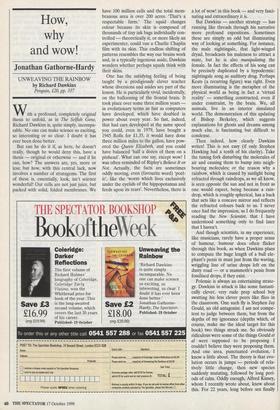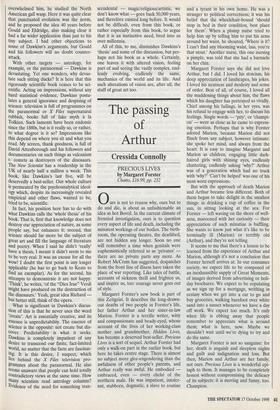How, why and wow!
Jonathan Gathorne-Hardy
UNWEAVING THE RAINBOW by Richard Dawkins Penguin, £20, pp. 337 With a profound, completely original thesis to unfold, as in The Selfish Gene, Richard Dawkins is, quite simply, incompa- rable. No one can make science so exciting, so interesting or so clear. I doubt it has ever been done better.
But can he do it if, as here, he doesn't really, though he would deny this, have a thesis — original or otherwise — and if he can, how? The answers are, yes, more or less; but how, with this central lack, now involves a number of stratagems. The first of these is, essentially, look, isn't science wonderful! Our cells are not just juice, but packed with solid, folded membranes. We have 100 million cells and the total mem- branous area is over 200 acres. 'That's a respectable farm.' The squid changes colour because its skin is composed of thousands of tiny ink bags individually con- trolled — theoretically it, or more likely an experimenter, could run a Charlie Chaplin film with its skin. This endless shifting of patterns resembles the way our brains work and, in a typically ingenious aside, Dawkins wonders whether perhaps squids think with their skins.
One has the satisfying feeling of being taught by a prodigiously clever teacher whose diversions and asides are part of the lesson. He is particularly vivid, incidentally, on the ballooning of the frontal brain. It took place over some three million years in evolutionary terms as fast as computers have developed, which have doubled in power about every year. So fast, indeed, that had cars developed at the same speed you could, even in 1979, have bought a 1945 Rolls for £1.35, it would have done three million miles to the gallon, have pow- ered the Queen Elizabeth, and you could have balanced 'half a dozen of them on a pinhead'. What can one say, except wow! I was often reminded of Ripley's Believe It or Not. Actually, the facts are sometimes oddly moving, even (favourite word) 'poet- ic', like the 'worm which lives exclusively under the eyelids of the hippopotamus and feeds upon its tears'. Nevertheless, there is a lot of wow! in this book — and very fasci- nating and extraordinary it is.
But Dawkins — another strategy — has running like threads through his narrative more profound expositions. Sometimes these are simply an odd but illuminating way of looking at something. For instance, the male nightingale, that light-winged dryad, broadcasts his maleness to attract a mate, but he is also manipulating the female. In fact the effects of his song can be precisely duplicated by a hypodermic: nightingale song as auditory drug. Perhaps Keats (a recurring figure) was right. Even more illuminating is the metaphor of the physical world as being in fact a 'virtual reality' — something constructed, even if under constraint, by the brain. We, all animals, live in an interior simulated world. The demonstration of this updating of Bishop Berkeley, which suggests explanations for ghosts and dreams among much else, is fascinating but difficult to condense.
Then indeed, how clearly Dawkins writes! This is not easy (if only Stephen Hawking had a tenth of his clarity). Take the tuning fork disturbing the molecules of air and causing them to bump into neigh- bouring molecules; or the reason why a rainbow, which is caused by sunlight being refracted through raindrops, as we all know, is seen opposite the sun and not in front as one would expect, being because a rain- drop, which is roughly spherical, has a back that acts like a concave mirror and reflects the refracted colours back to us. I never once had the impression, as I do frequently reading the New Scientist, that I have understood something only to find later that I haven't.
And though scientists, in my experience, like musicians, rarely have a proper sense of humour, humour does often flicker through this book, as when Dawkins plans to compute the huge length of a bull ele- phant's penis in must just from the waving, wriggling line of urine drops left on the dusty road — or a mammoth's penis from fossilised drops, if they exist.
Polemic is always an entertaining strate- gy. Dawkins in attack is like some fantasti- cally clever, very rude prep school boy swatting his less clever peers like flies in the classroom. One such fly is Stephen Jay Gould, an old antagonist. I am not compe- tent to judge between them, but from the depths of my ignorance (depths which, of course, make me the ideal target for this book) two things struck me. So obviously ridiculous were some of the things Gould et al were supposed to be proposing I couldn't believe they were proposing them. And one area, punctuated evolution, I know a little about. The theory is that evo- lution occurs in jumps — periods of rela- tively little change, then new species suddenly mutating, followed by long peri- ods of calm. Oddly enough, Alfred Kinsey, whom I recently wrote about, knew about this. For 22 years, long before sex finally overwhelmed him, he studied the North American gall wasp. Here it was quite clear that punctuated evolution was the norm, and he proposed the idea 40 years before Gould and Eldridge, also making clear it had a far wider application than just to his tiny subject. I had other objections to some of Dawkins's arguments, but Gould and his followers will no doubt counter- attack.
With other targets — astrology, for example, or the paranormal — Dawkins is devastating. Yet one wonders, why devas- tate such sitting ducks? It is here that this rigorously scientific book ceases to be sci- entific. Acting on impressions, without any hard statistical evidence, Dawkins postu- lates a general ignorance and despising of science: television is full of programmes on the paranormal or X Files supernatural rubbish, books full of fake myth a la Tolkien. Such laments have been endemic since the 1880s, but is it really so, or rather, to what degree is it so? Impressions like this depend on where you sit and what you read. My screen, thank goodness, is full of David Attenborough and his followers and documentaries on such things as vulcanism V. comets as destroyers of the dinosaurs. The New Scientist has a readership in the UK of nearly half a million a week. This book, like Dawkins's last five, will be deservedly a best-seller. Our whole culture is permeated by the psychoanalytical ideol- ogy which, despite its increasingly revealed empirical and other flaws, wanted to be, tried to be, scientific.
In fact, his position here has to do with what Dawkins calls the 'whole thesis' of his book. That is, first that knowledge does not destroy our appreciation of nature, as some people say, but enhances it; second, that science should far more be the subject of great art and fill the language of literature and poetry. When I said he didn't 'really' have a thesis, I meant it didn't seem to me to be very real. It was an excuse for all the wow! I doubt the first point is any longer applicable (he has to go back to Keats to find an exemplar). As for the second, his attempts to demonstrate it are not happy. `Think', he writes, 'of the "Dies Irae" Verdi might have produced on the destruction of the dinosaurs.' Yeah, great idea Richard but better still, think of the opera.
What is significant in Dawkins's discus- sion of this is that he never uses the word `create'. Art is essentially creative, and its essence is unpredictability. The essence of science is the opposite: not create but dis- cover. Predictability is what it seeks. Dawkins is completely impatient of any desire to transcend our finite, fact-limited World, no matter that the facts are fascinat- ing. It is this desire, I suspect, which lies behind the X Files television pro- rammes about the paranormal. He also seems unaware that people can hold totally contradictory views at the same time. How Many scientists read astrology columns? Evidence of the need for something tran- scendental — magic/religious/artistic, we don't know what — goes back 50,000 years, and therefore existed long before. It would not be difficult, even from this book, or rather especially from this book, to argue that it is an instinctive need, bred into us over millennia.
All of this, to me, diminishes Dawkins's `thesis' and some of the discussion, but per- haps not his book as a whole. Certainly, one leaves it with altered vision, feeling part of and seeing the vastly complex, end- lessly evolving, endlessly the same, mechanics of the world and its life. And such alterations of vision are, after all, the stuff of great art too.











































































 Previous page
Previous page